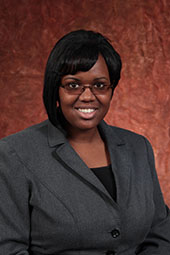CONTACT: Ron Hartung, FSU College of Medicine
(850) 645-9205; ronald.hartung@med.fsu.edu
By Ron Hartung
June 2012
MEDICAL STUDENT HONORED AS MINORITY SCHOLAR BY AMERICAN MEDICAL ASSOCIATION FOUNDATION
Shermeeka Hogans-Mathews Seeks To Practice Family Medicine
In Underserved Areas Like the One She Lived In
TALLAHASSEE, Fla. — Shermeeka Hogans-Mathews, a formerly underserved Medicaid patient who has just completed her first year at the Florida State University College of Medicine, is one of 13 recipients of a 2012 Minority Scholars Award from the American Medical Association Foundation. She will receive a $10,000 scholarship.
“I am completely humbled by this prestigious honor and recognition,” said Hogans-Mathews, 29. “It’s almost unbelievable, yet such a blessing and reassurance. I am very grateful.”
When the former Gadsden County (Fla.) high-school science teacher was considering medical school, some people had their doubts.
“Despite the advice for me to reconsider my career choice, I worked harder and studied harder, to prove to myself and others that your only hindrance from reaching your goals or dreams is yourself,” she said.
“My first year of medical school went well for me. I had heard horror stories and was intimidated at first, especially with anatomy, but quickly learned that I was in the right place and became confident in my ability to succeed.”
Dr. Curtis Stine shares that confidence.
“Shermeeka is committed to devoting her future career to working with the disadvantaged to eliminate health care disparities,” said Stine, associate chair of the College of Medicine’s Department of Family Medicine and Rural Health. “She sees this career goal not as a hobby, not as a job or even a career, but as a calling, and is living out this calling as a student by her volunteer and service activities in her community.”
Hogans-Mathews knows about health care disparities firsthand. She grew up in rural Liberty County, Fla., as the eldest of six children and became a first-generation college student. Although she’s now the married mother of three kids, for a time she was both a single parent and a full-time college student, and she learned how difficult it could be to gain access to health care. As a Medicaid recipient, she often encountered doctors who would not accept her insurance. The lack of physicians in her rural community helped her develop an interest in family medicine. Now she’s in the College of Medicine’s Family Medicine Scholars Program.
She’s also a leader in the local chapter of the Christian Medical Association and the Florida Rural Health Association. She has volunteered at various clinics in the community, and she’s active in her church and the community promoting health awareness, diabetes teaching, and counseling teens in weekly mentoring sessions.
“Balancing parenting, being a wife, a campus leader, medical student and youth leader in my church was at times overwhelming,” she acknowledged. “I was often asked by other students, ‘How do you do it?’ I often thought to myself, ‘How could I not?’ In medical school, you have an increased amount of responsibility, study material and duties, and you adjust to it. It’s the same with raising a family.
“My husband, Marcus, and my mother-in-law, Gussie Mathews, were a great help with the kids. Many times I needed encouragement and reassurance along the way, but God has brought me this far, and I have faith that He’ll certainly assist me through this journey to practicing medicine.”
Hogans-Mathews calls her mother, Patricia Hogans, the driving force behind her success: “My mom has always stood behind me, encouraged me and assisted me in any way that she could. She pushed me to excel and believe in myself and set the foundation for my work ethic.”
Before she became a medical student, Hogans-Mathews was involved in the College of Medicine’s outreach program.
“From our very first meeting, she knew that she wanted to become a physician,” said Thesla Berne-Anderson, director of college and pre-college outreach. “She possesses the determination, perseverance and stick-to-itiveness to achieve her goals.
“We are extremely proud of her accomplishments and know that she exemplifies the qualities of a true physician healer. Success is achieved by taking a dream and making it come true. Her dreams have definitely come to fruition.”
Hogans-Mathews has three more years of medical school, followed by at least three years of medical residency. Then what?
“I remain committed to return to an underserved and rural area much like Liberty County to practice family medicine,” she said. “I have developed quite a fondness for Gadsden County but am interested in possibly practicing in Liberty, Calhoun, Jackson and even Leon County.”
Hogans-Mathews is not the first College of Medicine student to receive the Minority Scholars Award. Ivan Porter (M.D., ’08) received it in 2005 and Brett Thomas (’14) in 2011.
The Minority Scholars Award, given in partnership with the AMA Minority AffairsSection with support from Pfizer Inc., promotes diversity in the medical profession and helps with the rapidly rising cost of medical education. Theawards recognize scholastic achievement, financial need and commitment to improving minority health among first- or second-year medical students in groups defined as historically underrepresented in the medical profession.
The AMA Foundation reports that, on average, future physicians graduate approximately $161,000 in debt, and in many cases the debt load is much higher. A large debt burden may deter many from practicing primary-care medicine or practicing in underserved areas of the country.


